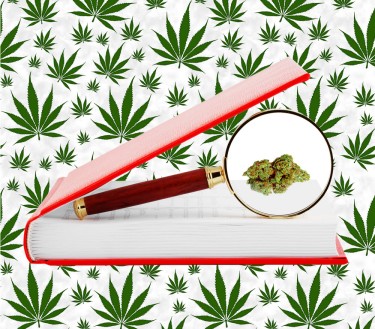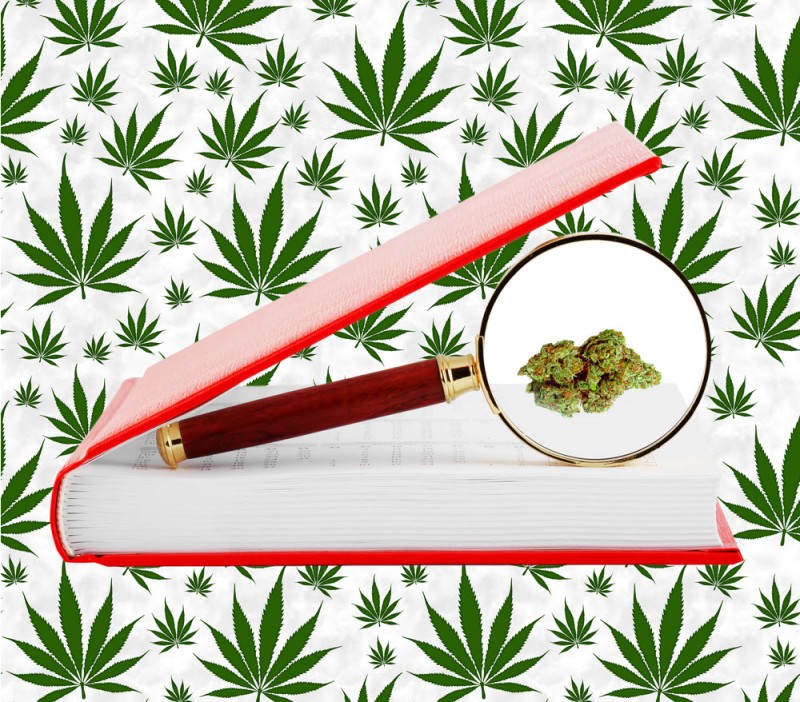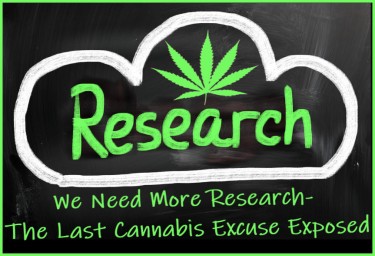
Marijuana Myth Buster: We need more research!
"We need more research!"
If I had a dollar for every time a politician uttered these words about cannabis, I'd probably have enough money to fund several lifetimes of research. It's become the go-to response whenever the topic of legalization comes up, a convenient way to kick the can down the road while appearing thoughtful and responsible.
But here's what keeps me up at night: How much research is enough? We currently have over 28,000 studies on cannabis, spanning decades of scientific inquiry. That's not counting the thousands of years of documented human use, dating back to some of humanity's earliest agricultural endeavors. Cannabis wasn't just any crop – it was one of the first plants our ancestors chose to cultivate. Think about that for a moment.
Yet somehow, in 2024, we're still being told we need "more research" before we can definitively say that cannabis is safer than alcohol – a substance that claims tens of thousands of lives annually. It's as if we're stuck in an endless loop of "studying" while ignoring the mountain of evidence already at our disposal.
Today, I'm going to help you cut through this smokescreen of perpetual research requirements. We'll look at the numbers, examine the facts, and hopefully put this tired old excuse to rest once and for all. Because let's be honest – if we haven't gathered enough data after thousands of years of human use and tens of thousands of scientific studies, then we never will.
Buckle up, folks. It's time to bust this myth wide open!
The past 10 years!
Let's talk numbers, because the figures are absolutely staggering. According to NORML's recent analysis of PubMed.gov data, scientists have published over 35,000 scientific papers about cannabis just since 2014. That's not a typo, folks – thirty-five thousand studies in the past decade alone.
To put this in perspective, we're seeing over 4,000 new cannabis studies published every year. That means by the time you finish reading this article, another researcher somewhere has probably published their findings about our favorite plant. The pace of cannabis research isn't just steady – it's exploding.
As NORML's Deputy Director Paul Armentano perfectly puts it, "It is time for politicians and others to stop assessing cannabis through the lens of 'what we don't know' and instead start engaging in evidence-based discussions about marijuana and marijuana reform policies that are indicative of all that we do know."
Here's a mind-blowing statistic: over 70% of all peer-reviewed scientific papers about marijuana have been published in just the last ten years. We're talking about the most intensively studied plant in modern history, with PubMed.gov now hosting over 49,500 scientific papers on marijuana dating back to 1840.
And what have all these studies taught us? Well, we know with certainty that cannabis is significantly safer than alcohol and tobacco – two perfectly legal substances that claim hundreds of thousands of lives annually. We know it's less dangerous than virtually every other substance listed in the Controlled Substances Act. We know it has legitimate medical applications – that's not up for debate anymore. And we know its addiction potential is comparable to coffee, not heroin (despite what its Schedule I status might suggest).
So when I hear politicians trot out the tired old line about needing "more research," I can't help but feel my blood pressure rise. It's not just a cop-out – it's an insult to the thousands of researchers who have dedicated their careers to understanding this plant. We have more than enough scientific evidence to create sensible, evidence-based cannabis policies right now.
Let's be real: continuing to hide behind the "we need more research" smokescreen isn't about science – it's about politics. Yes, there will always be more to learn about cannabis, just like there's always more to learn about any subject. But we know enough – more than enough – to move forward with full legalization and smart regulation.
The next time someone tells you we need more research before we can legalize cannabis, ask them how many studies would be enough. Then watch them squirm as they try to justify ignoring the mountain of evidence we already have.
Thousands of years of use
While our modern scientists continue to churn out studies about cannabis, there's another critical piece of evidence that prohibitionists conveniently ignore – humanity's thousands of years of direct experience with this remarkable plant. In fact, when you look at human history, cannabis prohibition stands out as the unnatural anomaly, a brief but destructive departure from our long-standing relationship with this plant.
Let's talk timeline. The earliest evidence of human cannabis use dates back to around 8,000 BCE in Asia, where it was one of the first plants cultivated for fiber, food, and medicine. That's 10,000 years of documented human use! The ancient Chinese pharmacopeia, the Pen Ts'ao Ching, dating back to 2700 BCE, specifically referenced cannabis as a medicine for treating a variety of ailments. Queen Victoria famously used cannabis tinctures for menstrual cramps, and even George Washington grew hemp at Mount Vernon.
Here's where it gets really interesting – our bodies actually evolved alongside this plant. The discovery of the endocannabinoid system reveals that we have an entire network of receptors that interact with cannabis compounds. Whether you believe in intelligent design or evolution, you have to acknowledge the remarkable symmetry here. We literally have a biological system that responds to cannabis – that's not coincidence, folks.
Every major civilization throughout history has documented beneficial uses of cannabis. It appeared in the United States Pharmacopeia from 1850 until 1942, recognized for its therapeutic properties in treating numerous conditions. Ancient Egyptians used it for glaucoma, Indians for digestive issues, and Chinese doctors prescribed it for over 100 ailments. This isn't ancient superstition – many of these applications are being validated by modern research.
So what happened? In 1937, against the advice of the American Medical Association, cannabis was effectively banned in the United States. This kicked off our grand experiment with prohibition – an 87-year detour that has brought nothing but suffering, incarceration, and death. The only beneficiaries have been pharmaceutical companies, private prisons, and law enforcement agencies who've built empires around cannabis criminalization.
Let's put this in perspective: we have 10,000 years of documented beneficial use versus 87 years of prohibition-induced chaos. When someone claims "we don't know enough" about cannabis, they're not just ignoring modern science – they're dismissing millennia of human experience.
Next time someone tries to tell you we need more research, remind them that cannabis has been extensively studied not just in laboratories, but in the real world, across countless cultures, over thousands of years. The evidence isn't just in peer-reviewed journals – it's written in the history of human civilization itself.
We don't have a knowledge gap about cannabis – we have a honesty gap among politicians who refuse to acknowledge what we already know.
The Sticky Bottom Line
After diving deep into the mountain of evidence surrounding cannabis – from over 35,000 recent scientific studies to millennia of documented human use – one thing becomes crystal clear: claiming "we need more research" is nothing but a smokescreen for maintaining prohibition.
I'm writing this article to arm you with knowledge, to inoculate you against the virus of prohibition that has infected our political discourse for far too long. The next time someone regurgitates the "we need more research" talking point, you can confidently counter with facts: we have tens of thousands of modern studies, thousands of years of documented use, and an actual biological system in our bodies designed to interact with this plant.
Those still clinging to prohibitionist views aren't just uninformed – they're actively choosing to ignore a vast body of evidence. It's like standing in a library and claiming books don't exist. The only explanation for such willful ignorance is the powerful influence of special interests who profit from keeping cannabis illegal. Big Pharma, private prisons, and certain law enforcement agencies have built empires on the foundation of prohibition, and they're not about to let facts get in the way of their profits.
Here's the ultimate irony: while our government was floating the idea of a "Ministry of Truth" to combat misinformation, they've been one of the primary sources of cannabis disinformation for nearly a century. From Reefer Madness to modern-day fear-mongering about the "dangers" of marijuana, they've consistently ignored science, dismissed history, and perpetuated lies to maintain their prohibitionist stance.
It's time to call out this hypocrisy. It's time to shut down bad-faith arguments about "needing more research" with the overwhelming evidence we already have. The truth is, we don't need more research to know that prohibition has failed – we need more courage from our politicians to stand up to special interests and implement evidence-based policies.
So the next time someone tells you we need more research on cannabis, ask them: "How many studies would be enough? How many years of human use would satisfy you? How much evidence do you need to acknowledge what we already know?" Then watch as they struggle to defend the indefensible.
The sticky bottom line is this: we have the evidence. We have the science. We have the history. What we need now is the political will to act on it. And that, my friends, starts with refusing to let tired old myths about "needing more research" go unchallenged.
Knowledge is power, and it's time we used that power to end prohibition once and for all.
INSPIRATION:
https://norml.org/blog/2024/12/23/analysis-over-35000-scientific-papers-
published-about-cannabis-during-the-past-decade/







